Dino Mustafić’s debut film, “Remake,” brought him numerous prestigious awards, including the Golden Tiger at the Rotterdam International Film Festival, while his award-winning theater career has been particularly exemplified by his play “Helver’s Night,” for which he won 17 international awards and recognitions. As the director of the International Theater Festival MESS in Sarajevo, he and his team have organized 16 of its editions.
Active in the socio-political scene, Mustafić is one of the public advocates of the RECOM initiative, fighting for the much needed establishment of facts about war crimes and other serious violations of human rights committed in the territory of the Socialist Federal Republic of Yugoslavia between 1991 and 2001.
K2.0 spoke with Mustafić about the status and importance of culture in Bosnia and Herzegovina (BiH) and the region, the attitude of the region and the European Union toward BiH, and the final way out of a vicious cycle of ethno-national politics and disregard for the truth.
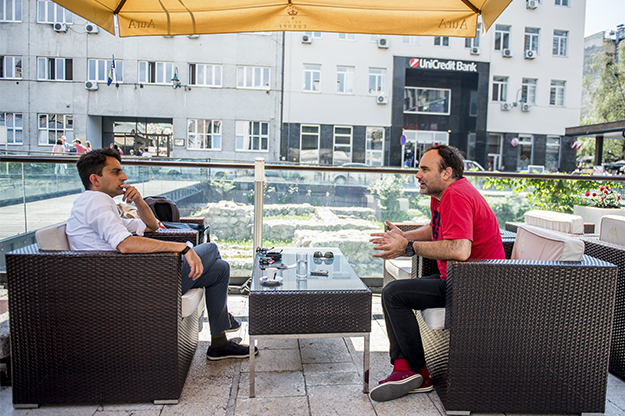
Photo: Imrana Kapetanović / K2.0.
K2.0: In a recent tweet, you stated that since 1978, not a single brick has been laid for culture in Bosnia and Herzegovina, pointing out the fact that the authorities literally ignore cultural infrastructure, and culture in general. Do the Bosnian authorities really despise, but also fear culture?
Dino Mustafić: I think there are a few explanations. The one that worries me the most, and at the same time leaves me bitter but also angry to an extent, is that the local political oligarchy did not understand that Bosnia is one of the few countries in Europe that has not been shaped by armies and political ideas, or by political parties. Thus, by having no military formations as such, it is a country that was truly articulated by culture, in the broadest sense of the word.
When you look at history, you can see that Bosnia is a country that was built on the margins of great empires; first of the Ottoman Empire, and then of the Austro-Hungarian Monarchy. You can see that this was a country with a very specific culture, that nurtured and fully respected the fact that regardless of which population was in the majority, you always knew that your first neighbor was actually Catholic, Orthodox or Jewish — regardless of the opinion of the official regime in Istanbul. Later it was the same with the Austro-Hungarian Monarchy.
So, this is about the concept of cultural coexistence. That concept, or better said the existence of a mentality of having good neighborly relations is something that is deeply ingrained in the essence of every individual in Bosnia and Herzegovina.
Then of course, culture, because of its character — because it connects people, helps integration, and creates inseparable relations, which later turn into a material heritage that we call cultural and historical heritage — was hit by nationalists in the 1990s, with the aim of destroying and suppressing any trace of the presence of diversity on Bosnian soil.
Then, naturally, the so-called production and distribution culture, the everyday one that manifests itself through productions in theaters, exhibitions in galleries, concerts in halls — with time this becomes a kind of unpleasant reminder for the witness and his/her relation to this articulated Bosnian identity.
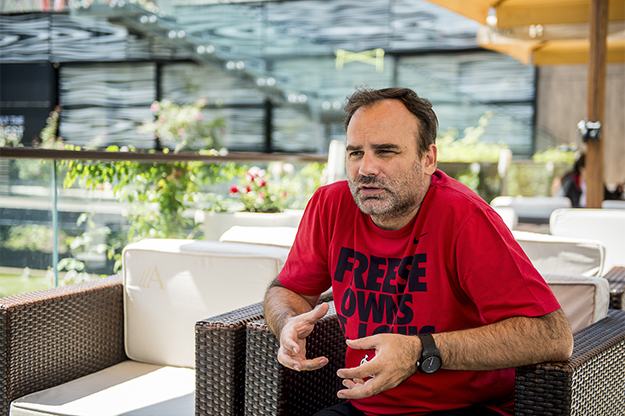
Photo: Imrana Kapatanović / K2.0.
Since we are living through times of identity reconstruction, in fact of a continuous historical revisionism, that culture that was specific, autochthonous, and polyphonic represents a great enemy of the current political mainstream and establishment.
This is because what is protected and insisted on today is segregation and isolationism. It seems that huge efforts are made toward the destruction of these multilayered, long-term, rooted, deep-seated connections that have in some way become the metaphysical space of this soil. It is being recreated by putting up some boundaries, or erecting mental dams in the minds of people, so that they not only have no knowledge about their own past, but look at their future with great uncertainty.
Therefore, in that sense, I think that culture par excellence is now a revolutionary factor in the Bosnian reality. It’s not by chance that culture resisted for so long, because it showed, above all, even before the devastation of the 1990s that even though it was fragile, vegetation, a plant that needs to be watered, nurtured, it also proved to be a very tough, persistent thing that did not break. And, in that sense actually, Bosnia’s cultural model is something that is in the way; it’s like a bone in the throat, like some foreign tissue to this current political mainstream.
I very clearly understand the reason behind the fact that I have posted on Twitter — that there is no investment in cultural infrastructure — that this is in large part also the intention of the authorities here, not to allow the development of cultural infrastructure. Because, by developing culture, developing a cultural network, developing cultural institutions, things can be qualitatively and substantially changed in our lives, and they don’t want to allow that.
It’s not just a matter of culture, I think we need to take education into consideration here as well?
Yes. When I speak about culture, I think in terms of what that word really is. Culture is the style, the way of life, the way we regulate community relations that do not come with some social and political order and system.
Was talking about ‘coexistence’, rather than ‘existence’, a smart response of the civic society? Because for me these are different things…
There were many other clumsy terms. One of them was tolerance, i.e. to tolerate each other. There has been a lot of political vocabulary in our everyday life that has infected these regions and it will probably require a lot of patience to decontaminate from them.
What is this thing that has entered our life? I agree: cohabitation means next to each other, and habitation means living together with one another. In the 1980s, we had an exceptionally balanced, harmonized society, in which no one was worried about ethnic percentages, and in which cities — cities especially — were the intersection of this new Bosnian identity and urbanity. Tito’s Yugoslavia, which had a very firm doctrine called “brotherhood and unity,” worked a lot on that, a doctrine with which many generations were raised, and truly believed in.
What shocked and surprised us all were the 1990s, when, with the advent of democracy, all those parties based on ethnic principles appeared. [What was also shocking was] how the skeleton from the wardrobe was quickly revived — incomplete World War II stories, which had been abused and used to mobilize people, who quickly turned against one another.
"When we talk about Bosnia, we are talking about exactly one culture, one soil, one mindset in which cultures crossed, created a different alchemy of mutual relations and formed a community."
However, we have lots of absolutely convincing evidence that — even when considering the most severe crimes in the territory of Bosnia — it has been undoubtedly demonstrated and proven that this hatred was brought into Bosnia from the outside.
This happened first of all through two aggressive nationalisms of the ’90s from the East and the West — meaning those from Serbia and Croatia — and I believe that Bosnia was collateral damage in the breakup of Yugoslavia. Of course, nowadays, there is that one tendency, which is absolutely incorrect, a non-argument, which has no historical proof and says: how can Bosnia survive if Yugoslavia broke apart?
Yugoslavia was always a political community, a conglomerate of the people who formed Yugoslavia with one very solid and frigid, at that time, socialist ideology. Before that, it was a monarchy, the Kingdom of Slovenes, Croats and Serbs. When we talk about Bosnia, we are talking about one, in fact, the autochthonism of exactly one culture, one soil, one mindset in which cultures crossed, created a different alchemy of mutual relations and formed a community.
Bosnia and Herzegovina was always said to be a ‘little Yugoslavia’…
That’s right. It was always said that Bosnia was some kind of a pulse, or heartbeat, or a positive reverberation of that Yugoslavia. However, after the ’90s, in a post-conflict environment where many values have collapsed, and new ones have begun to be built, we have been part of an almost three-decade-long government or dominant narrative. This narrative assures us that Bosnia is not possible with the breakup of Yugoslavia. And contrary to that, of course, culture not only verifies that this is not true, but culture denies it every day.
Many have tried to explain to me the attraction of Bosnian subculture. Indeed, when we go back to some Bosnian rock bands, when we think about, for example, bands like Index, or Bijelo Dugme, they are part of a different epoch.
When you take a look at members of these groups, you can really notice a weird chemistry at play: who plays bass guitar, who plays the guitar, who plays drums. Something very similar to what Dule Vujošević said about the Bosnian basketball national team. There is something erotic in a game when, in fact, Nemanja, a Serb, passes the ball to Senad, a Bosniak, and Senad returns it to Anto, a Croat. So this was something normal in Bosnia, natural, expected, and now what’s been done is a continuous attempt to change it for years through brainwashing…
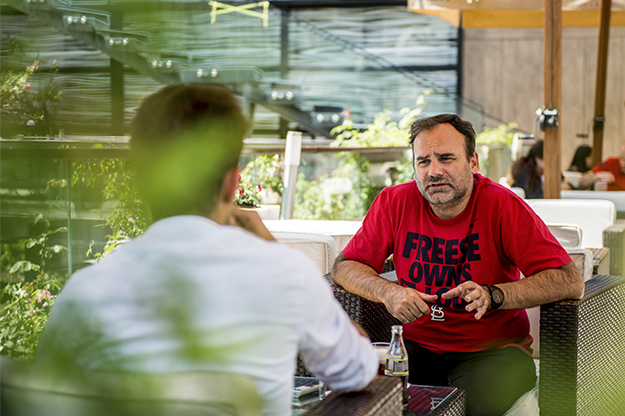
Photo: Imrana Kapetanović / K2.0.
An excellent question is whether that spirit still exists today.
Yes, it still exists in its embryonic stage, given this systematic destruction of what I’m talking about. There are some relapses, or maybe some kinds of small oases. One of them, in terms of the chains holding society together, is culture and art, and to a great extent sport. It’s not the case, of course, in the economy. They have their own algebra of profit. They earn money and, interestingly, this was not interrupted even in the most dramatic years.
So, it exists, but the only question that remains now is whether we have the strength to change the political paradigm and if these things, which are now positive incidents, can become our permanent environment.
"Much of us live with absolute disgust with politics, something that has already become a space of generational apathy, hopelessness, and resignation."
Much of us live with absolute disgust with politics, something that has already become a space of generational apathy, hopelessness, and resignation. We are witnessing everyday departures of the best people of this country regardless of which generation they belong to. Which, in a way, causes me to doubt that the future can be peaceful and promising, but obviously, for a long time we have not decided our own destiny.
I just hope that the Balkans will not be in the deck of cards of big players again. Above all I think of Russia and America, which obviously, together with their partner, the European Union, are the only ones to introduce order here in the Balkans and practically clean up our living rooms.
Those living rooms have long been covered up by old furniture that no longer serve anyone, and this furniture often hide skeletons which, from time to time, like Pandora’s boxes, open; usually when something needs to be done here again — some kind of trouble.
I’m glad that you mentioned the European Union, because one of my questions is precisely about the integration of BiH, but also of the region. We have these two neighbors, Croatia and Serbia, and their nationalisms that arose in the ’90s. Now we have Croatia already in the European Union, and Serbia is slowly preparing to join. And we have an obvious rise in nationalism, which I think is unprecedented — as many K2.0 interviewees, like Miljenko Jergović state, things have been never worse, even in the early 1990s. What kind of environment do we live in, and can our accession to the EU help us, or will it do us a disservice?
We are aware that joining the EU would not mean that we would solve all of our problems. We do not have another perspective. However, we are convinced that entering the EU will in some way impose the rule of law but we are also witnessing that many EU countries: Central European countries like Hungary, Poland, the Czech Republic, Slovakia — they have tendencies that are very worrying, ones that are bringing into question the general postulates of liberal democracy.
[These countries] are striving toward new models with religious doctrines. Orban is the first European leader who referred to Christian democracy. Therefore, I believe in what [German philosopher, Jürgen] Habermas said when he talked about the idea of the EU: that the EU must return to the principles that are the reason the EU emerged, in addition to being of financial interests, being a stakeholder group.
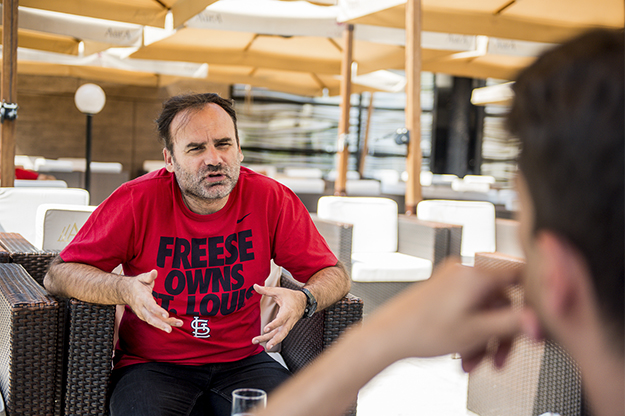
Photo: Imrana Kapetanović / K2.0.
What can the EU bring to the Balkans in the future? The Balkans, surely: its civilization, culturally and geographically belongs to the EU. In large part, the co-responsibility for the situation in the Balkans today is inertia, laziness, an emphasis on bureaucracy, the sluggishness of the European apparatus, and even a rhetoric that we are all fed up with that transfers responsibility exclusively to local politics and local relations.
It’s very hard to lift up our heads from the BiH perspective today, to extend our necks and look at the values of the EU, while being tied to the Dayton Constitution, an act which is inherently racist, chauvinist and discriminatory.
We are aware that BiH represents a kind of political laboratory of world powers, who formed a community that simply cemented and verified results of the war and destruction. It also stopped the war, but at the same time, [the Dayton Constitution] was not a document that could stop the conflict.
This conflict has transmitted now to other means: political, verbal… It simply waits for the right moment, like a seed of evil, which is not crushed, shattered, or destroyed, which is not publicly embarrassed, but is only covered up and then in various electoral cycles is more or less intensified, endangering the very survival of this country.
I think that Europe is aware that it is not possible to have controlled conflict in the Balkans, the circumstances are not good, because we are witnessing a radicalization, the rise of fascism of Europe. We are now seeing that some stable liberal, democratic societies, which were models for us in terms of their approach to foreigners and minority communities, such as the Netherlands or Sweden, are now shaken by real political earthquakes.
"We must take responsibility for who we are, and set up some landmarks indicating which way and where we want to go."
We are witnessing that some of the great European countries that are very powerful, highly populated and important, like Italy, have governments that are literally fascist or pro-fascist. So, we see that the circumstances are very dramatic; they are coming out of the sky like some dark clouds of the thirties over Europe.
We live in the times of an autocratic line of leaders of world powers like Trump or Putin. We are witnessing the expansionist, neo-imperialist ideas of Turkey, which is trying to re-establish certain interests [in BiH], referring to the Sultan’s patronage [in the Ottoman era].
So, we must somehow be aware that in a political sense, we must take responsibility for what we are, who we are and set up for ourselves some landmarks indicating which way, and where we want to go. I believe we have many nice and good things to offer Europe. We don’t just bring what is often called ‘tamni vilajet’ (the dark vilayet).
There are, however, many things that Europe would benefit from or would have a positive impact from in this region, because our Balkan identity is not something we should necessarily brag about, but it’s also not something we must be ashamed of, because it has always been a very specific region.
I absolutely don’t believe it’s something to be ashamed of, generally speaking, especially when it comes to our culture and history…
Right. But the only thing we really have to be ashamed of is that in fact, an interregnum has been created since the ’90s, which has not kept up with trends of social emancipation, which has not kept up with new technologies, or industrial development, or informatics. We have not kept up with where the whole world went in these thirty years because we were pulled back by warfare, the retro-mythical stories and concepts of the states. Now you see that time is passing, it’s unavoidable, and will not wait for us.
We didn’t deal with everything that happened, especially since the war obviously had no winner. And when the war has no winner, there is no one to write the history. This is why I’m curious about the story of RECOM. You are a part of RECOM, and you are quite active, so I am interested in why you think RECOM is important, and how it can help Bosnia.
I really do not think that RECOM has an alternative. RECOM is the largest joint action of non-governmental organizations that, to a large extent, brings together victims of war, their families, in order to close this chapter of the ’90s by confronting a truth that will not be relativized, will not be questioned, and will not be subject to reinterpretation. It will be factual, provable and exact. And that means, from the beginning, forensic truth.
This [forensic truth] will be primarily determined by the number of victims, then the narratives of the circumstances under which those victims were killed, and respect for those international instances, investigations, evidence, and processes.
This is something that has been left to us, as our legacy, by the International Tribunal in The Hague, together with a number of verdicts that clearly show the character of this war, revealing who was the aggressor and who was the victim. [This needs to happen not] as part of daily politics, but on a humanistic, universal level; so that such horrors, crimes and cruelty never happens again to the next generations.
Something like ‘Nunca Mas‘ [a report from the National Commission for Missing Persons in Argentina, founded after the dictatorship and the rule of the military junta]?
That is why RECOM is a very complex process that arose from the non-governmental sector, and came out from the deep feelings of the citizens of the former Yugoslavia, regardless of ethnicity: that all that happened to us can become a repeated story if we leave that space to politics.
We are now in a very complex, delicate situation in which we are trying to find half a million supporters for this initiative by establishing a regional commission that will go through the institutions of the system, through the parliaments of these states. What we aim for is making a transfer from a non-governmental initiative to an institutional encounter with the truth.
Unfortunately, we see how hard and slow it is. It’s been going on for twenty-one years after the war, and it’s quite clear to us why this is difficult.
The 1990s are used as a fuel for a new nationalism, which allows space for those political options that do not want a permanent solution here, which do not want peace here. In some way they always want to have some ground where they can inflict fear on others and in which they can abuse these unsettled avenues of the past for self-victimization.
Is it too late?
We do not have a choice. When we ask the question of whether it’s too late, I wonder what our alternative is. If it is not RECOM then it is a new war, new massacres, new suffering. No one can live with such bloody hands, because we know what that means — it is the end of the circle of some historical refrain of revenge and crime. At one point you have to stop. One time it has to be said: These politics were responsible and led to the war.
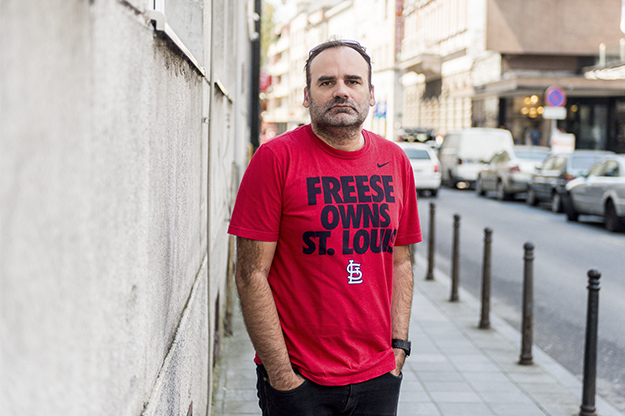
Photo: Imrana Kapetanović / K2.0.
What is terrifying is the engagement of the international community in the war, its testimonies, and its part in it. Books were written, newspaper reports were made, facts were established, verdicts were passed. In fact, they left us a tremendous amount of very serious material, documentation, that gave us no reason to doubt.
But what Europe did not insist on is banning the blatant whipping up of that past with those lies, which should be the conditio sine qua non of all future integration.
What gives me some optimism is that the EU’s strategy for the enlargement of the Western Balkans countries lists two very important things, both of which are in support of RECOM. One is the development of a good neighborly relations and the firm stand towards the past, and therefore a firm stance toward the crimes. So, if we want to be part of a civilized world, if we want to be part of the European Union — we will have to face [the past].
Again, we are back to the same question. Is there a desire to develop genuine and good neighborly relations?
No. Politicians today, in fact, build these relationships keeping their fingers crossed in their pockets. It’s far from the sincere rhetoric of mutual friendship because these politics want to have an enemy in the region, because if we treat it as settled, then we begin confronting real, existential issues.
"We have a lack of political movements, a lack of ideas. We are in need of greater engagement of the academic community, intellectuals, students — progressive, liberal forces, who would like to see healing of their community."
What is our public sector like for example? What about the health sector, the education sector, how much are they paid? [If we answer these questions] then we will get to the horrible findings that the economies of these countries, created by the breakup of Yugoslavia, can not reach the level of the Yugoslav economy in the next 20-30 years, and that even in the following half of the century, we can not reach the level of Scandinavian countries when it comes to social standards.
I think that we live in an atmosphere of constant empty promises, as well as estimates that are not founded on facts. At the same time, we have this complex situation with our politicians who have all the support they need to continue the same rhetoric for the last 25 years. So I think it’s important for us to find the way out of this vicious cycle.
We need a social revolution. The question is whether it is more likely to evolve gradually and peacefully. I am not a supporter of violent methods, I do not think that the street has ever made democracy function better. But there are other means we can employ. We have a lack of political movements, a lack of ideas. We are in need of greater engagement of the academic community, intellectuals, students — progressive, liberal forces, who would like to see healing of their community.
Unfortunately, we are witnessing the existence of a ruling of parties, a system called demokratur – a democracy and a dictatorship.. We are playing a game of democracy through the multi-party system. In them, instead of the former Communist single-mindedness, we now have a multi-party-mindedness, very limited, very clearly guided by its interests that operate as certain companies. Therefore, we have this loss of confidence in representative democracy.
I think that we should consider how — through the non-governmental sector, through those institutions and systems that should be the bearers of the progress of liberal values — to stop this clerical-conservative revolution that has occurred.
To stop this indoctrination, or to stop this downfall of Bosnia with ethnic democracy as the dominant model in which the collective interest of the people is reduced to nonsense through the ‘vital national interest’ mechanism in the state-level Parliamentary Assembly or the House of Peoples, which are actually used as a betting shops, and not as a bodies that regulate all collective rights of ethnic communities.
Second, until the sovereignty of a citizen, an individual as a bearer of change, and of a social entity, is established, for as long as we fail to return to other identities that determine us as people or human beings — such as what we do, what our profession is, how we contribute to the community, how we stand in certain relations such as friends, family, business — until we do that, it seems to me that there will be no luck.
This shift must come through a change in the political paradigm. We just need to listen to some of these politicians, who offer some sort of alternative, but it seems to me that they somehow remain lonely voices within this general party noise.K
This conversation has been edited for length and clarity. The interview was conducted in Bosnian.
Feature Image: Imrana Kapetanović / K2.0






